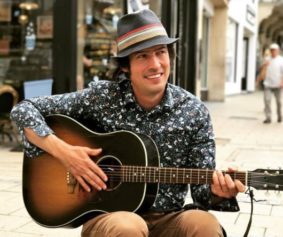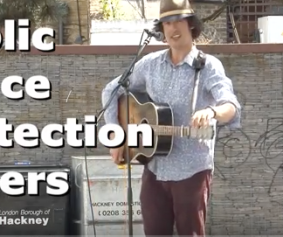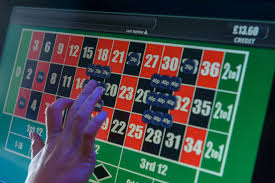A heartfelt celebration of the Life of Jonny Walker Campaigner Extraordinaire
At a wonderful jam packed service in Leeds Minister we celebrated the life and personality of Jonny Walker. This was my tribute.
Jonny was a man with a mission.
With his Keep Streets Live Campaign he was one the most determined, articulate and effective campaigners for a cause I have ever encountered. I first met him at a meeting of the London Busking Taskforce set up by the London Mayor’s Office to ensure that voluntary solutions to any busking issues were found rather than resorting to heavy handed bureaucracy.
Ironically as we met in City Hall a band of young musicians was being arrested for busking in Leicester Square.
I then hosted another meeting of the group at the House of Lords. Our work resulted in the launch of Busk in London and a new voluntary code of busking conduct across the city.
We were all veterans in one way or another of live music campaigns but Jonny was exceptional. Jonny was a active busker the length and breadth of the country and had experienced for himself the attempts by local authorities to restrict what they saw as a social nuisance but which he and we saw as an attempt to stifle street musicians and freedom of expression.
He had already shown how voluntary agreements on busking could work and had persuaded Liverpool and York councils to adopt a voluntary code of practice.
As a demonstration of his dislike for compulsory restrictions he took Camden Council to court for adopting an onerous busking licensing scheme under the London Local Authorities Act.
"What made Jonny so special was his mischievous sense of humour allied to his deep understanding of the legal issues involved."
— Tim Clement-Jones
What made Jonny so special was his mischievous sense of humour allied to his deep understanding of the legal issues involved.
A great example was when he and fellow buskers launched “The Church of the Holy Kazoo” religious group in Camden because the licensing scheme introduced by the Council didn’t apply to religious groups who wanted to perform. So Jonny and his colleagues created a new religious group to get round the restrictions and illustrate the futility of this new licensing regime.
In the same vein he was a great exponent of using YouTube to embarrass officials over using unjustified powers. Many of us saw his Romford Youtube video and were shocked by how far we had come in limiting freedom of expression in British towns.
He will be mourned in Leeds and Norwich too where he was active. But his influence went much wider . He highlighted busking issues in Newcastle, Bournemouth, Doncaster, Havering, Ha Indy, Canterbury, Swindon, Birmingham, Oxford, Chester Exeter, Gravesham and Bath all the time campaigning against restrictions, some petty, some major, all designed to erode traditional freedoms through instruments such the new Public Space Protection Orders.
At the end of last year we heard that because of the efforts of Jonny and our campaign we have succeeded in changing official guidance to ensure that it is much more difficult to ban busking through these orders.
In their obituaries, so many of our local newspapers saw him as part of their local culture. They claimed him as their own. Every major city and town across the country will miss him. Who will fight the bureaucrats and push back against the gradgrinds now?
Jonny was a bright light, infectiously enthusiastic and extremely likeable. He will be missed by his loyal fans across the country. He will be missed by his fellow campaigners. With an eclectic collection of headgear on head, guitar in hand and maybe with kazoo in mouth, Jonny we will miss you sorely.
Lord C-J calls for restriction on PSPO's
Back in the Summer buskers, civil liberty campaigners and many others protested about the increasing use of PSPO's a subject on which I have been campaigning ever since the Anti Social Crime and policing Bill became law.
See here
https://youtu.be/hI4oGE9JxSk
Recently I held a debate in the House of Lords to highlight the growing problem and the many examples where these powers had been used inappropriately and without proper authority or accountability. Our aim is to get the Government at the very least to change the guidance given to Local Authorities (the "Statutory Guidance") to make sure the powers are properly exercised and if that is enough to amend the original Act.
My Lords, I have for many years been passionate about the future of live music and am only too well aware that many of our most famous acts can have small beginnings, with many well-known artists starting their careers performing in small clubs and pubs or busking on the streets. It was for that reason that I promoted the Live Music Act 2012 and why, on my Benches, we became concerned about the impact of public space protection order powers under the Anti-social Behaviour, Crime and Policing Act 2014.
In response to concerns expressed by my noble friend Lady Hamwee on Report, the noble Lord, Lord Taylor of Holbeach, confirmed the importance of the statutory guidance, which would be consulted on. Ominously, he said that the essence was to allow councils maximum flexibility on the exercise of the new powers. That, I believe, is the root cause of the problem today.
Shortly afterwards, in January, I raised a Question in the House seeking further assurance on busking policy to make sure that local authorities would not resort to a PSPO before they had first exercised their noise-abatement powers. The noble Lord, Lord Taylor, said:
“The Government are certainly not seeking to restrict reasonable behaviour and activity, and we do not believe that these powers do. Live music and street entertainment play an important role in community life and can generate a positive atmosphere that is enjoyed by all”.
He also said:
“We believe that the tests and safeguards set out in the new anti-social behaviour powers will ensure that they will be used only where reasonable”.—[Official Report, 21/1/14; col. 571.]
In June of the same year, I raised issues regarding police attitudes to busking and received an equally positive reply from the noble Baroness, Lady Williams of Trafford, who I am delighted is replying to this debate. She said that,
“the Government are clear that appropriate busking can enrich a community’s quality of life and generate a positive atmosphere that can be enjoyed by many people”.
She also said that,
“we have undertaken … to include reference to busking in the guidance for the new anti-social behaviour powers for use by the police and others. This will be published shortly, in advance of the new powers commencing later in the year”.—[Official Report, 30/6/14; cols. 1531-32.]
Later in the year, in a different context, during the passage of the Deregulation Bill, both in Grand Committee and on Report, my noble friend Lord Stoneham and I pointed out the considerable powers that were already available to prevent noise nuisance. At the same time, we raised our continuing concern that public space protection orders would be used in a heavy-handed way. The Government, this time in the form of the noble Lord, Lord Gardiner of Kimble, gave assurances on both occasions that they were clear that busking can enrich a community’s quality of life and generate a positive atmosphere enjoyed by many people. But later he said:
“The Government do not start from the position that busking requires regulation and control”.—[Official Report, 11/11/14; col. GC 46.]
So right from the start we received a series of ministerial assurances about how the new PSPO would be exercised. Nevertheless, very soon, signs began to emerge of inappropriate use of the PSPO powers.
In February 2015, I asked an Oral Question about the operation of the Act and what use had been made of it to prevent or control busking. In reply, the noble Baroness, Lady Williams, said:
“We have made it clear in the statutory guidance for front-line professionals that they should not use the new powers to stop reasonable activities such as busking or other forms of street entertainment that are not causing anti-social behaviour”.—[Official Report, 12/2/15; col. 1354.]
Despite those ministerial assurances, it was becoming clear a year and a half ago that these powers were being used extensively in an inappropriate and disproportionate way. In fact, they were not just being used inappropriately to ban busking, they were being invoked for much wider purposes—for instance, to ban the homeless from the streets. In February this year, the Manifesto Club published its report, PSPOs: A Busybodies’ Charter, reflecting this, pointing out the extensive and disproportionate use of these powers and calling for proper limits to be placed on them.
In response to an Oral Question this February, I received yet more assurances from yet another Minister, this time the noble Lord, Lord Ahmad of Wimbledon. He said that,
“we have made it clear in the statutory guidance that anti-social behaviour powers should not be used against reasonable activities such as busking, where this does not cross the line into anti-social behaviour”.—[Official Report, 1/2/16; col. 1585.]
Despite a succession of assurances given over the years by at least four government Ministers, the problem of the inappropriate use of PSPOs worsens. Buskers are now falling foul of laws designed to break up dangerous public gatherings and risk being branded as criminals. The problem goes much wider. The Manifesto Club report shows that PSPOs are being used not only to criminalise busking but also the everyday lives of ordinary people, including the activities of the homeless, charity collectors, teenagers, skateboarders, parents dropping off kids at school and even those wearing head coverings.
Sefton Council’s ban on head coverings would include hats. Other councils, such as North East Derbyshire, have prohibited or are seeking to prohibit the carrying of golf bags, or the carrying of skateboards, as in Colchester. At least five have banned rough sleeping. Others, such as Gravesham Council, have prohibited lying down in public, which would prohibit lying on the grass or falling asleep in a public place.
At least six councils have banned or restricted music or street art. Hammersmith and Fulham Council has banned busking and public speaking in the area outside Shepherd’s Bush Tube station after 6 pm. At least 16 have created new criminal offences of loitering or congregating in groups in a public place. Hillingdon Council has prohibited people from gathering in groups of two or more unless at a designated bus stop, and Bassetlaw Council has banned young people aged 16 or under from standing in groups of three or more.
Kettering Council has banned skateboarding and created a curfew for under-18s, meaning it is now a crime for a 17 year-old to be out after 11 pm or before 6 am. In Oxford, the council has proposed a ban on any activity it judges makes people feel uncomfortable, and a city-centre PSPO has banned aggressive begging, street entertainment that causes a nuisance, remaining in a public toilet without reasonable excuse, and allowing dogs to enter any covered space. Hillingdon Council has banned noisy remote-controlled cars and pigeon feeding from its parks. Swindon Council has banned pavement art, thereby criminalising its resident and well-known pavement poet Danny Lake, even though 68% of the public voted against this.
So far, 80 councils have introduced PSPOs and more are threatening to bring them in. Police and local authorities, often based on the decision of a single official, and without consultation or a council decision, are throwing new orders about like confetti. A huge number of people are being dragged into the net of the criminal law. Clearly, the problem of improper use of these new powers extends well beyond busking: it is high time we took stock of this and amended the statutory guidance and, if necessary, the primary legislation, before our freedoms are eroded any further.
However, there may be a ray of sunshine. After my Oral Question last February, at the invitation of the noble Lord, Lord Ahmad, I, together with the Manifesto Club, the Kennel Club, Liberty, Keep Streets Live, the MU, UK Music, and others, wrote to him and his then Home Office colleague, Karen Bradley, to set out the current issues and demonstrate why changes are needed to the legislation and statutory guidance. Karen Bradley—now, I hope, in her new role stoutly upholding the rights of street performers and their contribution to local culture—wrote back defending PSPOs and the procedures used. She did, however, offer to consider amending the statutory guidance, and I replied in July, setting out what campaigners believe are the key problems and the changes needed to solve them. Let me spell these out.
First, PSPOs are targeting activities that are not in themselves harmful. The most problematic examples have banned activities that do not in themselves cause significant public nuisance or harm, such as rough sleeping, begging, loitering, standing in groups, swearing or skateboarding. We want to see a much stronger test before powers are used. PSPOs must target only activities that are causing significant public nuisance or harm; councils should not be able to use them for activities that some people just find annoying or unpleasant.
Secondly, the majority of PSPOs are being passed by single council officers. The Manifesto Club’s research found that out of the 56 councils that have passed a PSPO and provided data, half—that is 28 councils—have done this. Seventeen councils—30%—passed the order through a committee, but only nine—16%—passed it through a decision of the full council. They must be passed only after a debate of the full council and not based on decision of a single officer.
Thirdly, PSPOs are not being consulted on adequately. Although most councils have held a public consultation, in many cases these have been of extremely low quality. There must be a requirement for proper consultation, so that they cannot be imposed having asked just a few vague questions of residents.
Fourthly, the grounds and methods of appeal are too limited. We believe that the Government intended that these powers should be partly checked through the courts. There should be a much better right of appeal. Currently, appellants have very narrow grounds to appeal to the High Court, only six weeks to appeal and have to bear all the costs if they fail. The grounds of appeal should be expanded to something more like the test for judicial review, which would allow the worst cases of unreasonable PSPOs to be challenged and checked in the courts.
I am sure that we are here in the area of unintended consequences. Given Ministers’ assurances, I am sure that they did not intend the Act to be used in this way—banning rough sleeping, placing curfews on teenagers and so on. It is urgent and vital that they recognise that there is a fundamental problem with the Act. This may or may not be resolvable by changes to the guidance. I hope that we are making some progress and that amendments to the statutory guidance are being drafted as we speak but, in the light of the history of ministerial reassurances on this, I do not take anything for granted. I should like to hear specifically what is proposed.
Hence this debate about how the Government plan to ensure that these powers are invoked and exercised in an accountable, appropriate and proportionate manner: to find out whether demands for change, particularly to the statutory guidance, will be met. We cannot have local authorities and police services cracking down on our culture, ripping out the heart of our town centres and destroying the vibrancy of our local communities.
I have a note here from the Salvation Army. It states:
“Thank you for sponsoring a debate on the operation of the 2014 Act. We have had three of our front line locations raise concerns about the way in which Local Authorities are using Public Space Protection Orders in connection with homeless people spending time in public spaces … We would ask that government clarify their guidance to Local Authorities saying that PSPOs are not to be used to disperse homeless people rather than engage with them”.
I hope the Minister can today give cast-iron guarantees that the Government intend to make vital changes and will see them through.
Busking: Let's Back Voluntary Action over Regulation!
Good to see that the work of the Mayor's Busking Taskforce has now come to fruition with the launch of Busk in London and the new voluntary code of conduct.
Many congratulations to Paul Broadhurst, Julia Jones, Jonny Walker, Nick Broad and many others.
Reduce The Maximum Stake on FOBTs
Recently in the Lords I have been arguing (along with John Leech MP and Lord Strasburger) for a major reduction in the maximum permitted stake for Fixed Odd Betting Machines.
Currently this is £100. This allows users to bet up to £100 every 20 seconds. During 2013, £1.6 billion was lost by gamblers on FOBTs in Britain, with most of the money coming from some of the UK’s most deprived communities. There are now some 34,500 FOBTs across the UK. The £100 stake on FOBTs is more than 40 times the EU average; combined with the fast pace of play, this makes them particularly dangerous, leading to high levels of problem gambling.
Current Government proposals to require account-based play via a loyalty card or similar system or talking to a staff member if a customer wants to bet more than £50 per play are inadequate. It does not amount to a stake reduction.
Here is the link to the Lords Debate
http://www.publications.parliament.uk/pa/ld201415/ldhansrd/text/150224-0003.htm#15022476000486
And here is the Link to the piece I wrote for Lib Dem Voice




